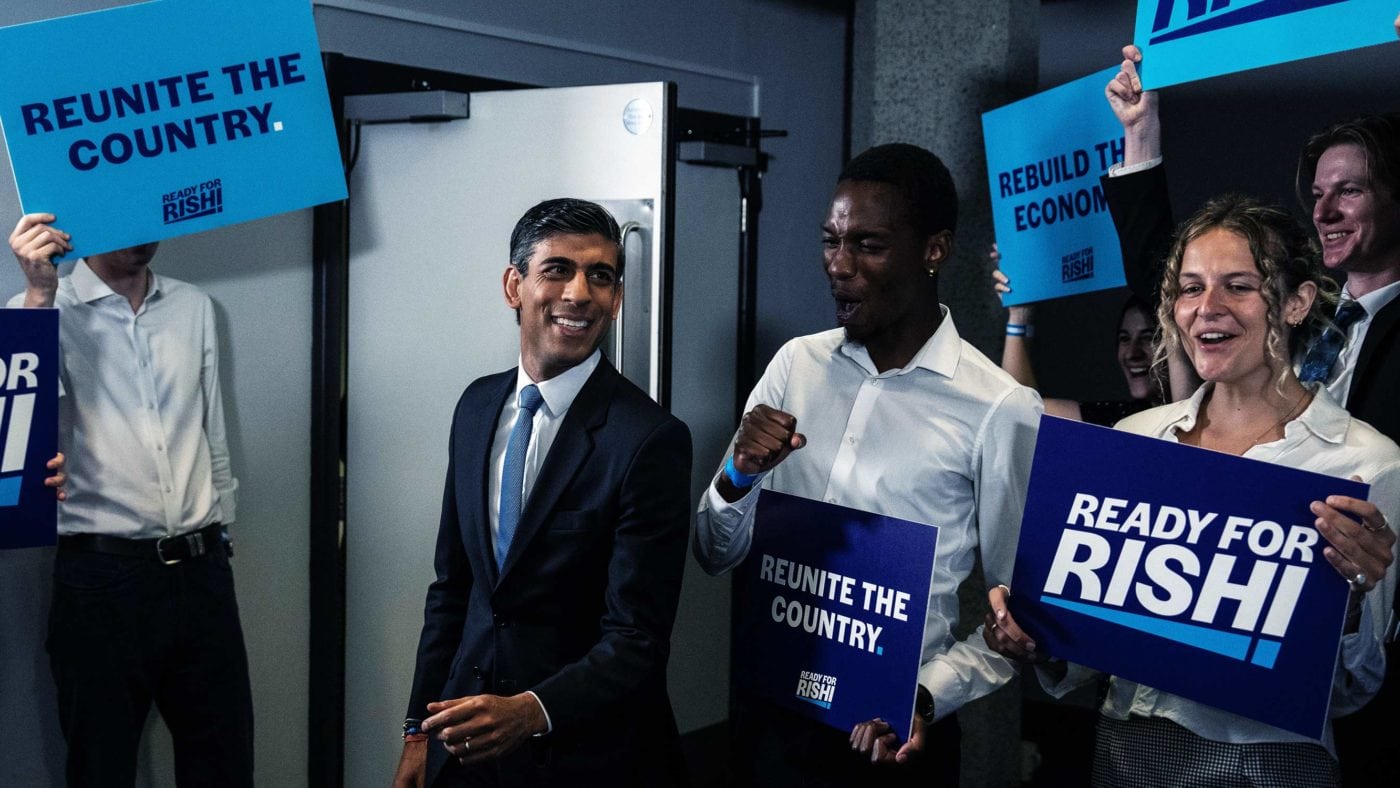In what is the most ethnically and racially diverse party leadership contest in British political history, half of the eight Conservative candidates who have made it through the first round of voting – Rishi Sunak, Nadhim Zahawi, Suella Braverman and Kemi Badenoch – are non-white. Had Sajid Javid and/or Rehman Chishti mustered more support among their colleagues, the proportion would be higher still.
Depressingly but somewhat predictably, it did not take long for the pseudo-liberal left’s miserable identity politics to rear its ugly head over this contest.
Indeed, not all that long after Boris Johnson issued his resignation statement we were treated to fox-bashing barrister Jolyon Maugham’s infamous and hastily deleted tweet asking Rishi Sunak: ‘Do you think the members of your party are ready to select a brown man, Rishi?’
Not to be outdone, ex-civil servant and one-time Liberal Democrat London mayoral candidate Siobhan Benita singled out Sunak and Braverman for supporting the government’s Rwanda plan to combat illegal immigration. According to Benita, ethnic minority Brits cannot simultaneously take pride in their own family’s migratory history and support the ‘despicable Rwanda policy’.
Then there was lawyer, activist and race-baiter extraordinaire Dr Shola Mos-Shogbamimu, who labelled Kemi Badenoch a ‘gift for racists’ and hysterically accused her of ‘enabling White supremacy against Black people’.
While identitarian voices have sought to portray the Conservative Party as a fundamentally racist institution and specifically targeted ethnic minority politicians vying to become the next Tory leader, I view the leadership contest as further confirmation of Britain being one of the most successful multi-racial democracies in the modern world.
To understand the degree to which the Conservatives have progressed, one only has to be reminded of the ‘torrid Sixties’ which included the 1964 Smethwick by-election and Enoch Powell’s notorious ‘Rivers of Blood’ speech in 1968.
It was widely reported that in the build-up to the by-election, supporters of Conservative candidate Peter Griffiths were reported as using the slogan ‘if you want a nigger for a neighbour, vote Liberal or Labour’. Griffiths refused to condemn the slogan as racist and told The Times that he fully understood the feelings of those who used it.
A few years later Powell – at the time the shadow defence secretary – delivered a speech in Birmingham that will forever be a stain on British race relations. In his deliberate inflaming of community tensions, Powell repeated a conversation with a voter who predicted that in 15 or 20 years, ‘the black man will have the whip over the white man’. Powell also platformed disparaging views of Britain’s supposedly ‘demanding’ Sikh communities – a group now renowned for their patriotic, aspirational, hard-working and generous-spirited values.
But for all the progress the party has made in recent years, the Conservatives still have plenty to do in terms of becoming more accessible and relatable to Britain’s ethnic and religious minorities. Indeed, they continue to miss out on a considerable pool of minority voters who live by the traditional triad of faith, family and flag. If the Conservatives won over more patriotic, family-oriented, community-spirited voters of faith, the party would become a seriously competitive force in inner-city areas and post-industrial towns which traditionally vote Labour.
Scandals ranging from Windrush to the more recent allegations of Islamophobia against Nusrat Ghani have not done the Tories any favours in terms of diversifying and broadening their electoral appeal. There is no doubt in my mind that the Conservatives could be doing far more to cultivate an uplifting, multi-ethnic, social-justice traditionalism that rises above tiresome, tribal identity politics.
But equally, to ignore the strides made by the Tories would not only be unfair – it would be overlooking one of the major sociopolitical developments of recent decades. The fact is that the Conservatives are now one of the most inclusive centre-right political parties in the Western world – one which is relatively accepting of its own society’s demographic diversity and at ease with the undeniable progress made by non-white politicians within its own ranks – thanks in no small part to the efforts made under David Cameron’s leadership to make the party more representatiive.
This is a party where people from ethnic minorities – many of whom boast considerable achievements outside politics – have reached positions of genuine power and influence. This includes two of the great offices of state – Chancellor of the Exchequer and Home Secretary. People are perfectly entitled to robustly disagree with their political views, but to deride these people as ‘sell-outs’, ‘coconuts’ and ‘Uncle Toms’ is not a sign either of maturity or, ironically, tolerance.
And for all the absurd rhetoric about ‘fascism’ in the UK, after 12 years of Tory-led governments, the UK is one of the world’s leaders when it comes to anti-discrimination protections on the grounds of race, ethnicity and religion. It is home to some of the strongest equality bodies in the world and affords considerable religious freedoms for its faith minorities. And for all of its flaws, the Conservative Party – the most successful political force in British (and western) democratic history – is currently holding a leadership contest where multiple ethnic minority politicians have ambitions to become the next Prime Minister.
For some people, the diversity which characterises the Tory leadership contest has triggered them into peddling their hateful identity politics.
For me, it is a welcome development in our wholesome national story of multi-ethnic political progress and social advancement.
Click here to subscribe to our daily briefing – the best pieces from CapX and across the web.
CapX depends on the generosity of its readers. If you value what we do, please consider making a donation.


